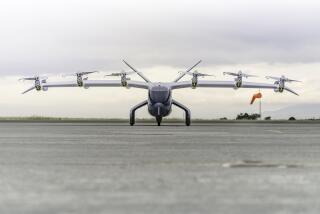Free Wi-Fi could cost you
A pair of high-tech companies is launching the first free, ad-supported, in-flight wireless network. This clears the way for passengers to shop for Paula Abdul’s Reach for the Stars Bracelet from the Home Shopping Network or an automatic pet feeder from SkyMall while soaring at 30,000 feet.
To be fair, the free wireless network, dubbed SkyTown Center, also will let travelers watch live television, play games and check out information about their destination city.
But the real goal of the service -- offered under a partnership between the airborne Wi-Fi provider Row 44 and the online media company JiWire -- is to squeeze a few more dollars from big-spending business travelers.
“This innovative new platform is a great opportunity for us to raise our brand awareness while generating revenue from a highly desirable customer base,” HSN Vice President John McDevitt said in a statement announcing the network.
In the same news release, SkyMall Vice President Casey Christ called the potential customers “captive air travelers.”
Under the plan by Row 44 and JiWire, these “captive” airline passengers won’t have to pay to log on to SkyTown with their computers. But if they want to navigate away from SkyTown to text, check e-mail or browse the Internet, they probably will pay a fee, based on how long they surf the Web.
Row 44 and JiWire expect to start the service by Nov. 1, just in time for the holiday shopping season.
The partners have yet to announce which airlines will offer SkyTown but they have confirmed some of the content providers, including the Home Shopping Network -- the marketplace for cosmetics, clothes and jewelry (Paula Abdul’s and otherwise) -- and SkyMall, the onboard retailer that peddles clothes, electronics and wacky items such as truck antlers and Harry Potter wands.
Airlines extend surcharge dates
With passenger demand hitting near-record lows, airlines are turning to what they call ancillary fees -- charges for checking luggage, snacks, wireless Internet, blankets and other extras -- to survive the tough economic times.
Last month, IdeaWorks, a Wisconsin research firm, reported that fees charged by airlines worldwide had generated $10.25 billion in 2008. That’s a 345% increase since 2006.
Among the new fees hitting passengers is a $10 “peak travel surcharge” added recently by American, Continental, Delta, Northwest and United airlines and US Airways for passengers who fly on the Sunday after Thanksgiving (Nov. 29) or on Dec. 19, 26 or 27, or Jan. 2 or 3.
But it now seems the airlines are extending the surcharge to several more dates in 2010.
According to FareCompare.com, the same airlines plan to charge the $10 fee for travel around the time most people celebrate spring break, Easter and Memorial Day. Those fees will be added for travel March 14, 20, 21 and 28, April 11 and May 28.
The good news is that discount airlines AirTran, JetBlue and Southwest have resisted adding the new charge. For now.
Concerts are taking flight
Most trends taking flight in the airline industry have been of a negative nature, such as charging for extras that were once complimentary.
But here’s a new trend worth singing about: airborne concerts.
In August, a Grammy-winning band from Mexico, Los Tigres del Norte, played a 100-minute concert on a flight from Toluca International Airport to Los Angeles International Airport to promote new service by the Mexican airline Volaris. The passengers included winners of a trivia contest hosted by a Mexican TV channel.
Following in that trend, the Black Eyed Peas, the Grammy-winning American hip-hop band, agreed to jam Friday during a four-hour flight from Melbourne to Perth in Australia on Virgin Blue.
The flight, onboard a specially modified Boeing 737-800 aircraft, was intended to raise funds for a children’s charity and promote the Australian leg of the Peas’ the E.N.D. World Tour. The band even agreed to join passengers on what may be the world’s first Mile High Karaoke party.
It is unclear how the latest trend began, but music historians might trace the movement back to 1969, when the Beatles played an unannounced concert on the roof of their Apple Corps headquarters on London’s Savile Row. From that point, the only direction musicians could go was up.
--
More to Read
Inside the business of entertainment
The Wide Shot brings you news, analysis and insights on everything from streaming wars to production — and what it all means for the future.
You may occasionally receive promotional content from the Los Angeles Times.











